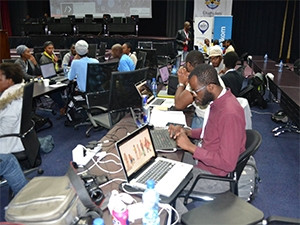
More than 150 innovators from different provinces gathered at the Alberton Civic Centre for the weekend-long Ekurhuleni Metropolitan Municipality Hackathon (EMMHack) to help solve the city's challenges through innovation.
An initiative of the City of Ekurhuleni, the EMMHack, which is now in its second year, seeks to motivate young people to be involved in more ICT-related activities and develop solutions that will help the city accelerate service delivery in an efficient manner.
The hackathon requires innovators to turn their ideas into practical solutions that can be used for the challenges presented to them by the municipality.
Held under the theme "A Digitally Connected City", this year's event saw teams that include developers, Web designers, entrepreneurs and engineers from areas like Ekurhuleni, Soweto, Mpumalanga, Cape Town and KwaZulu-Natal attempt to solve the city's challenges.
Teams had to come up with solutions for challenges such as responsive cities, intelligent analytics for the city, human settlement application monitor, cloning of existing smart solutions and department works.
The city provided access to open data to participants and encouraged the use of various technology platforms to build apps that address the challenges.
Although the innovators were given five challenges to solve, the main challenge the city wants to see resolved is the issue around human settlement, said Ekurhuleni's divisional head for ICT, Lydia Ntlhophi.
She explained: "We've seen the protests. People are really frustrated because they have been waiting for years.
"Someone can just write a resident's name on a piece of paper and a resident can be promised a Reconstruction and Development Programme (RDP) home based on that. The list can't really be tracked because it is very manual and there is no feedback mechanism.
"We also have properties that we rent and in terms of applying for rental we don't have an app or any automated solution where residents can just check what is available and register and apply online for a home."
According to Ntlhophi, there is a huge budget for housing and the processes don't support the allocation of RDP houses, which results in the city not even spending the money set aside for housing.
"We end up spending time trying to track lists with names, starting the lists from scratch and that delays the process even further."
city
Ntlhophi said Ekurhuleni is leveraging technology to solve service delivery issues, and events like the hackathon will be used for educational purposes and to develop innovative solutions as a way of moving the city forward.
Last year, Ekurhuleni joined the free Internet revolution seen in the City of Tshwane, as well as other cities that are leading the way to provide public access. The Ekurhuleni Metro introduced free WiFi in various phases, starting with libraries and clinics.
To date, the city has already rolled out 2 000 hotspots, with the aim of reaching 3 000 WiFi areas by June 2017, Ntlhophi said.
"As we position ourselves as a digital city we obviously need to do things differently. We are more inclined to digitalising a lot of our processes and making sure our services are accessible on a mobile phone."
The EMMHack saw the innovators come up with five mobile app solutions that will be used by the city.
The solutions will ensure the city's apps are improved and provide increased citizen engagement and efficiency when it comes to service delivery, said Ntlhophi.
The top five solutions will be improved to provide real life solutions for Ekurhuleni residents, she said.
"With the world rapidly switching to a digital era, opportunities are out there for young people. It is only upon them to utilise such platforms to create solutions that can make a difference."
Father and daughter team, Naledi and Pule Phafane, scooped the first prize, walking away with R100 000 for their Vula Robot invention. The app from the open robot team eases traffic congestion by controlling how long traffic lights remain open through mobile devices.
In second place was Dul Track, who received R50 000 for developing a solution consisting of hardware and software to help reduce accident rates on the roads.
At third place was Blue Mars, who received R20 000 for their housing and human settlement application to monitor housing allocation and minimise corruption.
Share